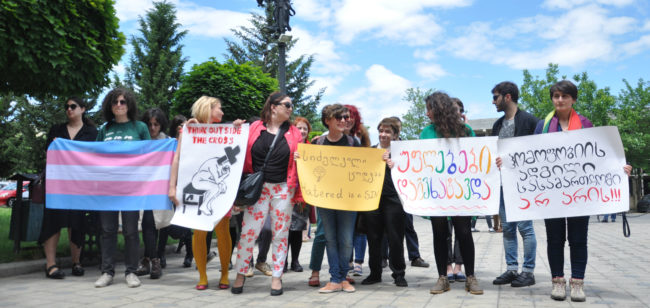
 Several prominent civil society organisations in Georgia have come out in support of civil partnerships for same-sex couples, while the government is attempting to amend the constitution to explicitly define marriage as a union between a woman and a man.
Several prominent civil society organisations in Georgia have come out in support of civil partnerships for same-sex couples, while the government is attempting to amend the constitution to explicitly define marriage as a union between a woman and a man.
The government has been discussing constitutional amendments to outlaw same-sex marriage for several years; this despite same-sex marriage already being expressly forbidden under Georgian law.
While a draft constitutional amendment has been presented to parliament and is awaiting approval, a number rights groups are attempting to improve the rights of queer people in the country.
Eleven organisations issued a joint statement on 10 April in response to the draft amendments, claiming that it is important to add that ‘other forms of co-living are to be regulated by the law’ to the amendment, leaving open the possibility of same-sex civil partnerships.
‘Tighter restriction of LGBT rights, when hate motivated crimes aren’t effectively investigated and there is a high frequency of homophobic and transphobic crimes, will only worsen the human rights situation of the LGBT community in Georgia’, the statement reads.
The organisations claim that the amendments are a populist move, and that raising the ‘protection of Georgian traditions’ is often used as a tool to serve political interests.
‘For years, manipulation using the protection of the traditional family and prohibition of same-sex marriage have become a part of the Russian and anti-western narrative’, the groups writes.
Former Prime Minister Irakli Gharibashvli first suggested the amendments to ‘better formulate marriage’ in 2014. He argued that there is similar legislation in many EU states, like Croatia and Latvia.
Despite Georgian legislation already defining marriage as the union of man and woman, Garibashvili argued that it was necessary to ‘avoid incorrect interpretation’ and amend the constitution as well.
The current constitution reads that ‘marriage shall be based upon equality of rights and free will of spouses’, but doesn’t specify the gender of spouses.
Gharibashvili said at the time that the changes wouldn’t create new rights for anyone or give any groups of people additional privileges.
The rights groups write in their statement that despite Croatia’s ban on same-sex marriage, the country has adopted a law allowing civil partnerships between same-sex couples.
Among the signatory organisations were the Open Society Georgia Foundation, Transparency International Georgia, the Georgian Young Lawyers’ Association, Women’s Initiatives Supporting Group.
Several months after a mob of tens of thousands of enraged people violently attacked a couple of dozen people marking International Day against Homophobia and Transphobia on 17 May 2013, the leader of the Christian Democratic Movement began to collect signatures in support of banning same-sex marriage in Georgia’s constitution.
The amendment became one of the ruling Georgian Dream party’s major election promises in its 2012 campaign. Georgian rights organisations and queer communities have never undertaken a serious campaign for marriage equality in the country.




 10 April 2017
10 April 2017


